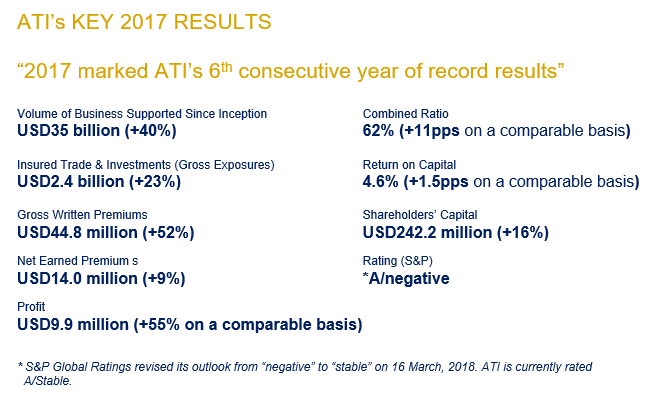NAIROBI, 04 June, 2018 – During a press conference to unveil its 2017 results, the African Trade Insurance Agency (ATI) announced that it is positioning itself to provide even more support to its member countries across Africa with a specific focus to help governments reduce their cost of borrowing and provide an alternative to raising foreign currency debt through bond markets or syndicated loans, which currently accounts for 60% of the region’s total public debt.
“The continent is currently searching for African solutions to tackle development challenges such as affordable access to financing. As a strong African institution, ATI is poised to become a go-to option for African governments,” noted George Otieno, ATI’s Chief Executive Officer.
The multilateral investment insurer posted record results in 2017 for the sixth consecutive year with a 55% increase in profits and USD2.4 billion in gross exposures, and it is on track to pay dividends for the first time to shareholders.
Buoyed by continued strong results, the company is pursuing a strategy to help governments access more affordable financing. To achieve this, ATI is plans to work with more governments to provide a one-stop risk mitigation solution to lenders. This allows countries to negotiate more competitive rates that can reduce their cost of financing by as much as 100 bps per annum for example, on loans of USD250 – 350 million.
In 2017, ATI took several steps to ensure its readiness to offer this level of support. First, it is focusing on large strategic deals in order to support governments’ development priorities. For example, in 2017, ATI provided insurance cover on a USD159 million loan to Ethiopian Airlines to support the carrier’s fleet expansion. In this instance, ATI’s support ultimately furthers Africa’s development agenda – as the continent moves towards full implementation of a free trade zone, airlines such as Ethiopian will be key drivers facilitating the movement of goods and people across Africa.
In 2017, ATI also strengthened its governance as another step to readying itself for an expanded role across Africa. By reconstituting its Board, which now ensures rotation, fair representation on a constituency basis and infusion of new talent, the company can better accommodate expected growth in membership. This process led to the installation of a new Board and Chairman. The new Chairman, Dr. Yohannes Ayalew Birru, is the Vice Governor and Chief Economist of the National Bank of Ethiopia. He is also an Alternate Governor of the IMF.
Speaking during the press event, Dr. Birru commented “I am delighted to be nominated to this post. ATI is an African institution that is under-utilized by member governments at a time when ATI can be the most useful. Through high-level discussions, awareness raising and focused workshops, I believe we can show governments how to better leverage their partnership with ATI to help further their investment and trade objectives while also providing an alternative to costly financing.”
In addition to Board-level changes, ATI is expanding its presence in key markets to include office openings in Benin, which will operate as ATI’s West Africa hub, Côte d’Ivoire and Ethiopia. Importantly, ATI is also planning to undertake a rebrand in order to better reflect its new positioning as a strategic investment insurance partner to Africa and the world.
The recent restoration by S&P’s of ATI’s ‘A/Stable’, is proof that ATI’s strategy is gaining traction. In 2016, S&P placed ATI on a negative watch prompting the company to step up efforts to recover payments on sovereign claims while also putting in place structures to avoid future payment delays by governments. In 2017, ATI successfully negotiated repayments on member government’s outstanding sovereign claims, which made it possible for S&P to restore ATI’s outlook to stable.
As a signal of ATI’s growing relevance, governments reimbursed all but one claim that is pending review, and in its last assessment in March 2018, S&P also noted that ATI could qualify for an upgraded rating once its capital reaches USD250 million, which the institution is on track to achieve in the next year.
